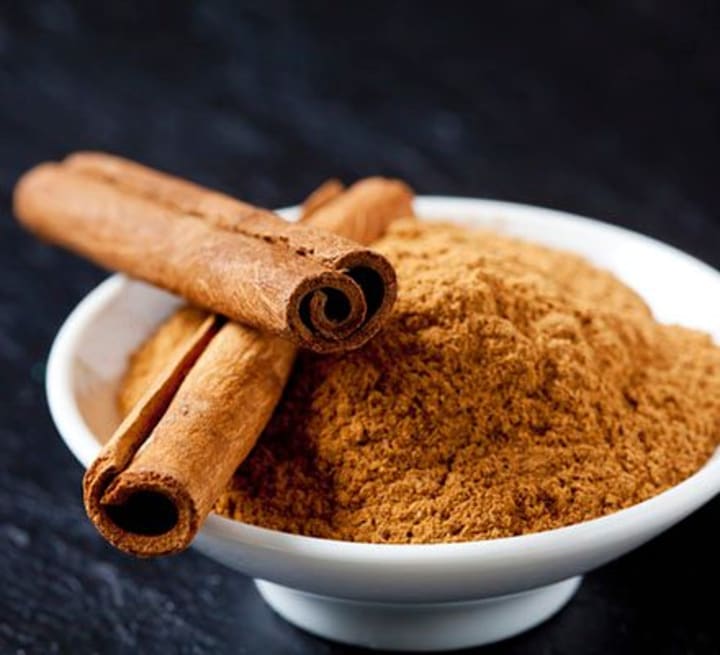Cinnamon
Cinnamon benifits for health

Cinnamon is a spice that is obtained from the inner bark of trees belonging to the Cinnamomum genus. It has been used for centuries for its aromatic flavor and medicinal properties. Cinnamon is known for its antioxidant, anti-inflammatory, and antimicrobial properties. It is also a rich source of minerals such as calcium, iron, and manganese. In this article, we will discuss some of the most significant health benefits of cinnamon.

Anti-inflammatory properties
Inflammation is a natural response of the body's immune system to injury or infection. However, chronic inflammation is linked to various diseases such as heart disease, cancer, and Alzheimer's disease. Cinnamon contains compounds that have anti-inflammatory properties, such as cinnamaldehyde, cinnamic acid, and cinnamate. Studies have shown that cinnamon can reduce inflammation in the body by inhibiting the production of pro-inflammatory cytokines and enzymes.
Lower blood sugar levels
Cinnamon has been shown to lower blood sugar levels in people with type 2 diabetes. It does this by improving insulin sensitivity, which allows the body to use insulin more efficiently. Insulin is a hormone that regulates blood sugar levels. Studies have shown that consuming cinnamon can lower fasting blood sugar levels by up to 29% and improve HbA1c levels (a measure of long-term blood sugar control).
Antioxidant properties
Cinnamon is a rich source of antioxidants, which protect the body from damage caused by free radicals. Free radicals are unstable molecules that can damage cells and contribute to the development of diseases such as cancer, heart disease, and Alzheimer's disease. Cinnamon contains polyphenols, which are compounds that have potent antioxidant properties. Studies have shown that cinnamon can reduce oxidative stress and protect against DNA damage.
Lower cholesterol levels
High levels of LDL (bad) cholesterol in the blood can increase the risk of heart disease. Cinnamon has been shown to lower LDL cholesterol levels in the blood. It does this by reducing the amount of cholesterol that is absorbed into the bloodstream and by increasing the breakdown of LDL cholesterol. Studies have shown that consuming cinnamon can lower LDL cholesterol levels by up to 27%.
Anti-microbial properties
Cinnamon has potent antimicrobial properties that can help to fight off infections caused by bacteria, fungi, and viruses. Cinnamaldehyde, a compound found in cinnamon, has been shown to inhibit the growth of several types of bacteria, including Escherichia coli and Salmonella. Cinnamon oil has also been shown to be effective against Candida albicans, a common yeast infection.
May improve brain function
Cinnamon may also have a beneficial effect on brain function. Studies have shown that cinnamon can improve cognitive function, including memory and attention. It may also help to reduce the risk of age-related cognitive decline and Alzheimer's disease. Cinnamon contains compounds that can improve blood flow to the brain and increase the growth of new nerve cells.
May have anti-cancer properties
Cinnamon may also have anti-cancer properties. Studies have shown that cinnamon can inhibit the growth of cancer cells and induce cancer cell death. Cinnamon contains compounds that can reduce the formation of blood vessels in tumors, which can help to limit their growth. Cinnamon may also help to reduce inflammation in the body, which is a risk factor for cancer.
May improve dental health
Cinnamon may also have benefits for dental health. Cinnamon oil has been shown to have antimicrobial properties that can help to fight off bacteria in the mouth. It may also help to reduce bad breath and prevent cavities. Some studies have shown that cinnamon oil can be as effective as traditional mouthwash in reducing bacteria in the mouth.
While cinnamon has potential health benefits, it is important to note that more research is needed to fully understand its effects on human health. Additionally, cinnamon should not be used as a substitute for medical treatment and individuals with certain medical conditions should speak with their healthcare provider before using cinnamon as a supplement.

About the Creator
We uses things benifits
Uses of things we use everyday and how to weight lose naturally and how to increase skin whitening






Comments
There are no comments for this story
Be the first to respond and start the conversation.